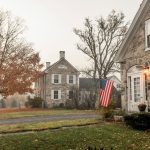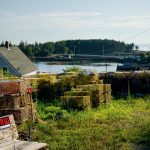A Change of Seasons | Life in the Kingdom
Spring arrives with fresh chores and the realization that life moves on.

Coffee By Design | Portland, Maine
Photo Credit : Katherine Keenan
More so than in any other year I can remember, the end of winter feels like emerging from a tunnel, one so long that the light at the other end is no more than a pinprick, just enough to orient yourself toward it, to keep moving forward one slow step at a time. And when we finally pass through that opening, blinky-eyed and pale, into a sea of mud and rain and all the fecund smells of spring, it almost feels like a trick: Surely, this is just a tease. Surely, winter can’t be done with us.
Our older son, Fin, now 17 and sporting a freshly minted driver’s license, has bought his first car, a 1993 Volvo 240 station wagon with a mere quarter million miles on the clock. He paid $1,000 to our friend John, who believes that Volvos—specifically, Volvo 240s—are the finest automobile ever made, and he has managed to convince our son of the same. And while I’m skeptical, I can see the appeal: Fin’s new car carries its ugliness with such confidence it almost passes for handsome, and driving it evokes a certain nostalgia. It’s slow and navigates the road in a ponderous fashion, making mysterious clunks over minor irregularities. But the brakes work and the seat belts buckle, and therefore we are as pleased about the situation as any parents of a teenage driver can reasonably expect to be. Which is not very, but still, at some point you have to let go.
The day after he takes title, on a cool and rainy morning in May, Fin asks if he can drive to Boston to visit a friend. Although we don’t love this idea, we give our blessing. And when he returns home unscathed, full of confidence and the flavor of freedom on his tongue, I realize that something profound has shifted, and that no matter how many more times he might return home in body, there’s another part of him that is not coming back.
The back roads continue to recover from the mud and ruts of spring, and slowly the leaves burst, the green moving a bit farther up the mountainside every day, an unfurling wave. The cows are restless behind the barbwire fence of their winter paddock; when I bring them hay, they run the fence line in a spirited, high-stepping way, and I think that surely this will be the day they charge straight through the wire. But they never do.
Two hundred bare-root blueberry plants arrive. We’d ordered them in February, having convinced ourselves that a small pick-your-own operation was our ticket to early retirement. When spring was such a remote possibility, planting 200 blueberry bushes somehow seemed like a good idea. Now it seems absurd, almost as if we’ll need to bend time in order to make it happen. But the plants are here, and there’s no turning back, so we dig and dig and dig some more. Blisters rise on our palms, painful reminders of our excessive optimism.
When the grass reaches my boot tops and is just beginning to bend under its own weight, I release the cows, and immediately I am brought up short by a sound that is at once familiar and brand new to me every spring: the sound of cows eating new grass. Because it sounds like nothing else in this world, you’d think I would remember, but I never do. It’s not a crunch, not exactly, but it’s something like a crunch, and it is accompanied by the lazy back-and-forth swishing of their tails. I stand and listen for a few minutes, leaning on the shovel I’m using to dig just a few more blueberry holes on my way in from chores.
Fin’s Volvo breaks down. It’s the crankshaft position sensor. With John’s help, he fixes it. He installs new front brakes: calipers, pads, and rotors. He fixes something else, but I can’t remember what. Then it breaks down again and has to be towed home. He fixes it (again, I don’t remember what) and drives it for two more weeks before it needs another tow. Sensing a trend, I upgrade our AAA towing coverage. He borrows our car, and—believe it or not—that breaks down, too.
I drive our old Ford pickup an hour and a half to retrieve Fin from the side of the road. The car is stuck in gear; I push against the shifter as hard as I dare, but it will not budge. Because it’s an automatic, the key won’t release from the ignition unless the transmission is in park, and because I cannot get the transmission in park, we leave the car unlocked, key dangling in the ignition. We remove what valuables we can find (a roll of stamps and our favorite James McMurtry CD being chief among them) and drive away. I entertain a small fantasy of simply abandoning the car. I’d paid $2,000 for it barely six months earlier, and thus far it’s proven to be only slightly more reliable than my son’s Volvo, despite having half the miles and being 15 years younger.
On the way home, Fin and I stop for ice cream. It’s a warm evening, and we roll our windows down. I think that I should feel discouraged—after all, we’re down to one 16-year-old truck of questionable reliability—but I’m not. Maybe it’s because summer is right around the corner. Or maybe it’s because I’m driving with my son, something I used to do so often but which has suddenly become a rarity. Once, I might have thought it an imposition, an interruption. After all, there are still at least a few dozen blueberry bushes to plant. The cows have chewed through the season’s first square of pasture and need moving. So many looming projects, some half done, some not even started. And the broken cars to deal with.
But all that is for another day. Right now, it’s just the ribbon of asphalt before us, the taste of ice cream on my tongue, the company of my son, and the dawning realization that winter feels like something that happened a very long time ago.





Great article! Made me laugh.
Wonderful story. Enjoying life. Even the ups and downs.
This article is just lovely in its humanity. It made me cry. Life in these United States.
Sounds more raspberry than blueberry????
Great story—enjoyed every word!
I grew up in the NEK and hayed many fields before hay balers, loose hay. A few tourists would stop in the road and watch us. This was in the ’50’s. It was hard work but formulated work ethics and values. In Newark (nice hill town) there was 27 dairy farms. Town kids would know when a person drove by-who it was and where they were going. We relished eating green apples and rub cow salt in them. The worse thing we did was to light a firecracker in fresh cow flop and see how far we could get before we got splattered. Hunted crows by hiding behind grave stones in the cemetery, they roosted in the dead pines, and would always outfox us.
That was about 67 years ago, Since then I spent a stint in the Air Force during the Cold War with Russia and flew many times with nukes, graduated with a college BSME, had an engineering business for 26 years, obtained an instrument flying rating, raised a family, and enjoy life and still have those life’s values and memories. I was blessed in the best of times.
That was VT before all this turmoil and the influx of the Montpelier government outsiders. I consider VT was the best place to be raised in. Now Newark is devoid of any dairy farms and that lifestyle.
What a moment in time and wonderful expression of farm life and the road
of life, thank you for the gifts that come to us unexpectedly. George Singletary